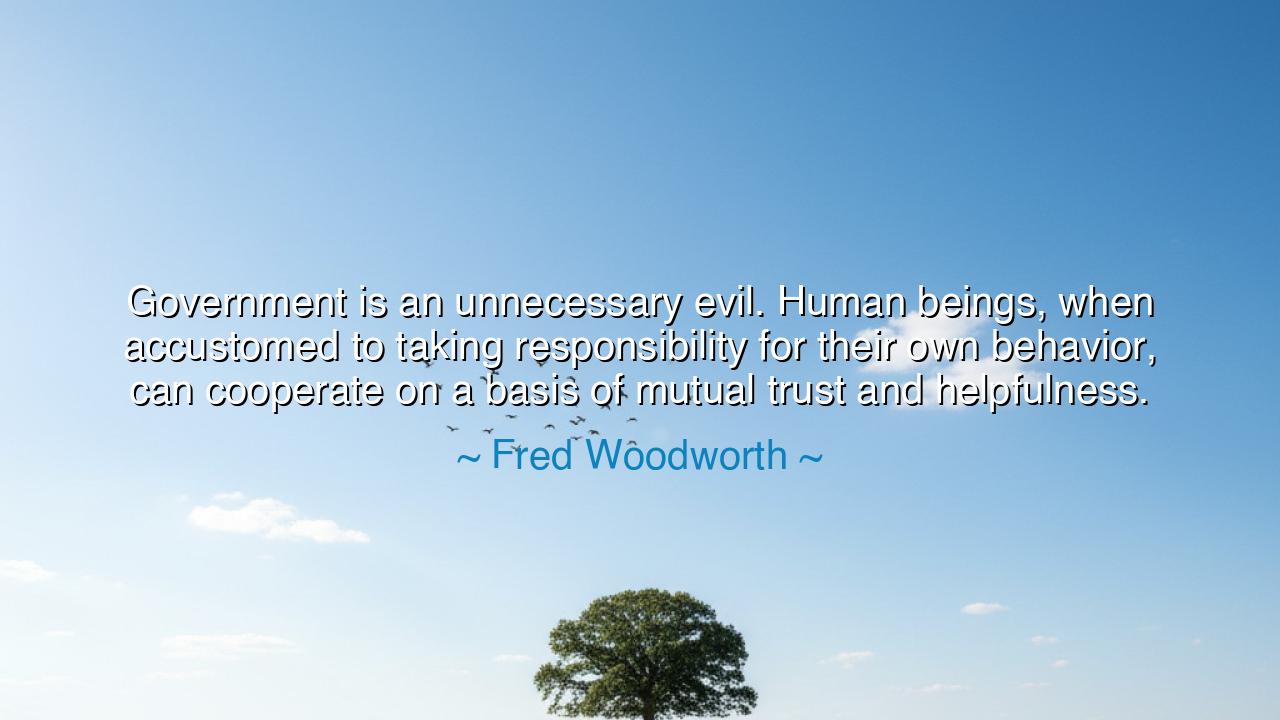
Government is an unnecessary evil. Human beings, when accustomed
Government is an unnecessary evil. Human beings, when accustomed to taking responsibility for their own behavior, can cooperate on a basis of mutual trust and helpfulness.






In a world long accustomed to chains both visible and unseen, the anarchist philosopher Fred Woodworth spoke words that shimmer like light through storm clouds: “Government is an unnecessary evil. Human beings, when accustomed to taking responsibility for their own behavior, can cooperate on a basis of mutual trust and helpfulness.” These words are not the cry of a rebel without faith in mankind — they are the proclamation of one who believes too deeply in human potential to surrender it to authority. Woodworth’s insight pierces to the heart of the human condition: that the more we depend upon rulers to guide our lives, the less capable we become of guiding ourselves. His vision, radical yet ancient, is a call to rediscover the natural harmony that lies within free and conscious beings.
The origin of this idea arises from the long and restless tradition of anarchist thought — a philosophy not of chaos, as its enemies claim, but of harmony through liberty. Woodworth, a writer and editor of The Match!, stood in the lineage of thinkers such as Henry David Thoreau, Leo Tolstoy, and Emma Goldman, who all taught that moral order must come from within, not from compulsion. He looked upon government not as a protector, but as a parasite that feeds upon the weakness of its people — an institution born of fear, sustained by obedience, and justified by the false belief that humans cannot live without masters. Yet Woodworth did not despise mankind; he trusted it. He saw that evil does not vanish when transferred to a government; it merely gains a throne.
When he says “Government is an unnecessary evil,” he speaks to the heart of dependence. Governments arise, he believed, when people abandon their own moral responsibility — when they prefer to be ruled rather than to rule themselves. But what if, he asks, men and women learned again to take responsibility for their own actions? What if cooperation replaced coercion, and mutual respect replaced fear? Then trust would grow where laws once stood, and helpfulness would flow where punishment had once ruled. The chains of authority would rust away, for they would no longer be needed. Humanity would not descend into anarchy’s chaos — it would ascend into anarchy’s peace.
History offers moments when this truth has been glimpsed, however briefly. Consider the story of the Spanish villages during the Civil War of the 1930s. When fascist forces threatened Spain, many rural communities rejected both capitalist and communist hierarchies, choosing instead to govern themselves through voluntary cooperation. They shared food, work, and resources; they built schools and hospitals without orders from any government. For a time, they lived by Woodworth’s ideal: self-governance through mutual trust and helpfulness. Their experiment did not last — crushed by war and external power — but its spirit endures as proof that free human beings, unshackled by coercion, can indeed build a just and compassionate society.
Yet Woodworth’s vision also carries a challenge. To live without government is not to live without responsibility; it is to bear it more fully. Freedom is not a license to act without care, but the obligation to act with wisdom. For if men cast off law but keep their selfishness, they will recreate tyranny in another form. Thus, the foundation of Woodworth’s philosophy is moral maturity — the inner discipline of those who govern themselves. A free people must learn to respect the freedom of others; a self-ruling soul must master its own passions before seeking to master the world. In this way, trust is not naïve — it is the highest form of strength.
In the modern world, where surveillance replaces safety and laws multiply faster than understanding, Woodworth’s words strike like thunder against complacency. Every law written to “protect” becomes a temptation to surrender judgment. Every camera meant to “watch over” becomes a symbol of mistrust. Yet the truth remains: no system, however vast, can create goodness in hearts that do not will it. Real cooperation arises not from compulsion but from choice — not from fear of punishment, but from recognition of shared humanity. The world Woodworth envisions begins not with governments, but with individuals choosing to live honorably without being told to.
The lesson, then, is not to abolish governments by fire, but to outgrow them through virtue. Take responsibility for your life — for your choices, your community, your relationships. Be the law unto yourself, not by arrogance, but by conscience. Let your actions be guided by empathy, your words by honesty, your hands by service. Build trust as a farmer builds soil — slowly, patiently, faithfully. For when enough people live this way, the need for government fades like a shadow at sunrise. The evil becomes unnecessary because the good has been awakened.
So, my child of freedom, remember Fred Woodworth’s words not as rebellion, but as prophecy. The true revolution is not fought in parliaments or prisons — it is fought within the soul. Each time you choose kindness over control, trust over suspicion, and responsibility over obedience, you move the world closer to his vision. For someday, when mankind grows wise enough to live by its own conscience, the government will no longer need to rule — and human beings, in their trust and helpfulness, will at last rule themselves.






AAdministratorAdministrator
Welcome, honored guests. Please leave a comment, we will respond soon